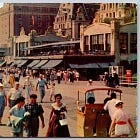Notes on Love and Life: A Port in the Storm
How we navigated our unsettled early years as we continued to seek stability as young gay men in the big city.
This is the second part in a four-part series of essays by Howard N. Fox.
Next Up»Part 3
The Final Essay: “Rounding Third Base”
My high school and college years were pretty fallow sexually—except for chronic masturbation (probably not unusual for almost any young fellow). There was no internet or graphic print mags in those days, and the sexual fantasies that I enjoyed, over and over again, were very graphic and particularized, focusing on details I noted in locker rooms or running amok in my imagination of almost anybody I might have seen on the street or in class, fully clothed. The couple of very brief encounters with girls and—almost desperately, with guys—were in my mind forbidden, which is to say “immoral.” Eventually I got over that.
Douglas and I met at the University of Wisconsin, Madison, where I was finishing up my master’s degree in literature, and Douglas was returning to complete his undergraduate degree, also as a lit major. We’re very nearly the same age, but Douglas had enjoyed a year-long stint as an exchange student in Norway during high school. Plus, he skipped his college classes for another extended period, spending a raucous year in New York City, tomcatting all of the gay bars and haunts around town. Now he was back in school, having more-or-less settled down.
We met on February 4, 1970 at the first Gay Liberation meeting in a church adjacent to campus. I’d previously had a couple of homosexual encounters, one or two nights at a time, with guys I knew. But that night I was out specifically to get my first pickup. Unbeknownst to either of us, it would be my last, and his, too.
Douglas and I went to his dorm room and spent the night together in bed. Then we decided to get together again the next night at my off-campus apartment. We’ve been together ever since that first night.
Soon enough, Douglas abandoned his month-to-month lease and moved in with me. At the end of the spring semester, we moved to Washington, D.C. (where I’d spent my undergraduate years at nearby University of Maryland), with no particular plan for the future, but still infatuated with each other and eager to move from Madison to a cosmopolitan city.
“We were horny kids, broke and on summer vacation—and we loved it.”
We loved that hot, sultry summer in the former swampland of the Potomac, going almost nightly (so it seems in my rosy memory) to the neighborhood bars and restaurants, typically having enjoyed sex at least once, often twice, at home earlier each day. We were horny kids, broke and on summer vacation—and we loved it.
During that summer, Douglas’s parents drove from Marion, Iowa, where his dad had been superintendent of schools for many years, to visit and see how their son was faring in the nation’s capital. We knew what they didn’t: It was clearly time for them to know what they might have suspected but didn’t know how to deal with.
After the cheery hellos, Douglas broached the subject, explaining that he was gay and we were a couple. Of course, they were deeply distraught, confused, and dismayed. After some awkward struggling with how to respond, they excused themselves and were back home in Iowa by the next day. Douglas was as plainly upset as they, and deeply hurt by their abrupt departure.
In the end, however his parents did not reject him, nor us, and in fact on numerous occasions over the years came to visit us after we moved to Los Angeles. Understandably, there would always be a tacit undercurrent of tension and incomprehension, especially for Douglas’s father, John, who once confided to Douglas’s younger sister that he feared that Douglas’s misfortune (as he conceived of his son’s homosexuality) was his fault. As he explained, he thought it was caused by the fact that he’d dropped his infant son, causing some sort of brain damage—or some such explanation to account for this aberrant human being whose condition had befallen him.
While his parents soon did accept both Douglas and me for who we are, they never could fathom that they were somehow not responsible for the deviant mishap of their son’s reality. They could not conceive that straight parents had begotten queer offspring quite naturally through all of human history, everywhere. Oddly, many parents even in the 21st Century, still fear that the LGBTQ+ “abomination of nature” is an infection caused by recruitment and careful grooming by pedophiles and villainous malefactors. They don’t, or won’t, or can’t believe that we queers are their native sons and daughters. Even so, it turned out that Douglas’s parents were more accepting and open-minded than Douglas, or even they, realized.
As for me, I came out to my parents a short time before I even met Douglas. They were accepting, although my father’s first response, after listening patiently and knowingly to my account, declared: “You don’t have to tell anybody anything. It’s only your business.”
Now, I knew my father already had his questions about my sexuality. Once when I was still in high school, we were having lunch together at a restaurant, as he and I sometimes did, and he commented in passing (in a clause of some longer sentence), “Well, maybe girls aren’t your cup of tea….” Nonetheless I was disheartened to hear him say that my sexuality should remain closeted. I protested, explaining that this was a new era—a period of sexual revolution and openness about one’s self—that was more accepting and embracing of diversity in all its dimensions. I was surely a youthful idealist, but I was right. This was the first and last that this issue ever came up with my parents. Indeed, after Douglas and I moved to Washington together we became very close with my parents and all their remarkably wide circle of friends and relatives, who recognized and happily accepted Douglas and me as part of the family. If they ever talked behind our backs, it was never apparent to us. This was a deeply gratifying part of Douglas’s and my couplehood until my parents both were gone, decades later.
My family were non-practicing Jews; in fact, my father professed to being an atheist. (Indeed, he was mightily scornful when my mother requested, to everyone’s surprise, that she wanted a rabbi to officiate at her soon-approaching funeral. I had to calm him down and sternly tell him it was her funeral, not his. He accepted that with equanimity.) Douglas was raised Presbyterian, but, unlike his church-going parents, he had absolutely no participation in organized religion. If, back in the early 1970s, we had been believers in a personal deity, of whatever religion, we would have acknowledged that our relationship, for all its shortcomings and faults, was somehow blessed—even during our early storm-tossed years. We knew it then, and we still know it today.
But back to our early years.
By September of 1970, the year we met, we were both back in academia, this time at the University of Maryland. I was in the PhD program, while Douglas quickly completed his undergraduate degree. By the following September, we were both graduate students and fortunate to be teaching our own lit courses. Not as paper-grading slaves to some yellowing professors lecturing from yellowing notes, but making our own syllabi and reading lists for undergraduate classes. By the next year, we both had waiting lists of students hoping to get a coveted seat in our classrooms.
Teaching was great! Douglas ultimately received his BA, MA, and PhD degrees at UM and went on to be appointed to the English department faculty at Temple University, commuting to Philadelphia, while I remained at Maryland completing all my PhD coursework. But Douglas’s weekly departure from home marked the first time we were separated from each other, even for a single night. He taught on Tuesday and Thursday mornings, taking the Amtrak to Philly on Monday afternoons and returning to D.C.’s Union Station late on Thursday or Friday afternoons. We often went out to dinner those evenings. I must admit, they weren’t always pleasant reunions. The separation caused great strains and resentment between us. We argued often and vehemently, and sometimes physically, shoving each other about.
We came to reckon with each other, knowing that our sometimes-grotesque resentments, hostilities, and knocking each other around were not normal, nor to be shrugged off as if “that’s the way things are,” and certainly not to be tolerated. Our gross immaturity embarrassed ourselves, and, to those who sensed it, our friends and family. This behavior could not last, not if we were to last. We wanted to be together and to stay together despite it all.
Gradually, perhaps too gradually, we grew up. The compromises, the accommodations, the silences we had to abide over the next couple of years often seemed like putting up or shutting up—each to the other. Yet, over time, we came to realize that what seemed like the impossibility of bearing with each other was not a loss of faith or love, but its increase. We came to appreciate that if we could have done it differently from the start, we’d have averted heaps of doubt and grief. But we did love each other, and we shared the same hopes and ideals.
As we learned a lot from each other and each about ourselves, we continued to forge a relationship that we sensed could last. We’d inflicted and endured much to and from one another. Through our evolving union, we generated an emotional, intellectual, and trusting maturity that we share to this day. The cost of that hard-earned wisdom over the years has been high, and yet its fulfillments are priceless. Lessons well learned!
As we continued with our quasi, not-too-long-distance split for a couple of days each week as Douglas commuted between Philly and D.C., we came to realize that we were both feeling somewhat constrained in academia. The fact that some intellectually hidebound professors (whose seniority conferred some sway over the department’s policies) got to preen their hides in perpetuity was beginning to chafe.
Douglas wanted out and, within three years, he left Temple University to pursue his own career as a publisher of Sun & Moon, a quarterly literature and art magazine devoted to experimental poetry, drama, fiction, and current visual art, with Douglas as publisher and chief editor and me as contributing art editor. My father aided him financially in this venture, which soon earned non-profit status and within a few years Sun & Moon Press garnered considerable notoriety as a book publisher, earning numerous prestigious grants, including from the Mellon Foundation, the National Endowment for the Arts, the Wallace Foundation, and an out-of-the-blue substantial cash award from the Foundation for Contemporary Arts (co-founded by John Cage and Jasper Johns).
I never completed my doctorate because, in September 1975, I had the absolutely good fortune to land a temporary job as a research assistant at the recently opened Hirshhorn Museum and Sculpture Garden, one of the Smithsonian Institution’s museums on the National Mall, and the first federal museum devoted to modern and contemporary art. By that time Douglas had already departed Temple University to devote his formidable talents as a writer and publisher to his burgeoning literary career. While we both continued to teach at the university level and give public lectures for many years after our departures from our universities, academia was now behind us, as we pursued new ideals…









